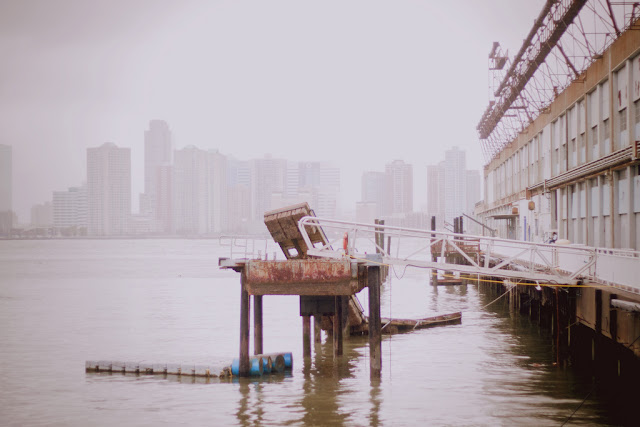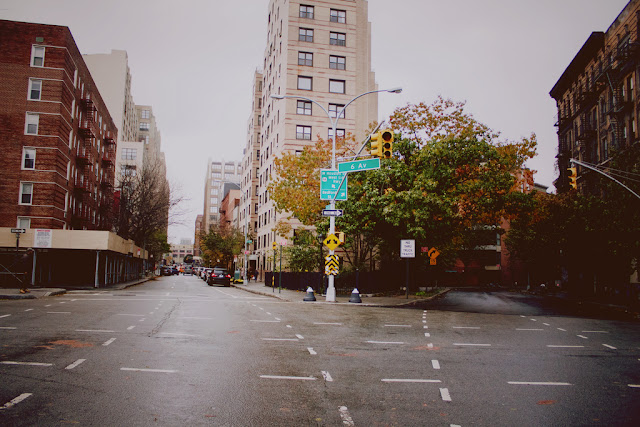A few days before Hurricane Sandy hit this area, I was one of many who were barely thinking that anything serious would happen. There have been lots of hurricanes before, and they all ended up being weak incarnations of gross overestimations of destruction. So no one, including myself, was expecting the "stock up" warnings to be necessary in the long run.
The clouds were dark and overcast on Sunday, October 28th, and the wind and rain were picking up momentum. Class was cancelled, at first just for Monday but then for the entire week, which gave us students a euphoria that now seems terribly inappropriate in the wake of the storm. How could one grateful for a natural disaster? The power went out on Monday and the night was, I daresay, quite enjoyable. There was a strong sense of camaraderie that took hold of everyone on our floor. New friends were made and older friends became closer. The storm strengthened a lot of ties in some of the sweetest, most heartwarming ways—but I don't want to talk about that.
 |
| An uprooted tree. |
It was soon announced that due to the widespread power outage (a transformer had exploded on 14th Street, a video of which can be seen here), we would have to evacuate to one of the few NYU buildings that has back-up power. The subways were completely shut down—flooded, with no estimated time of recovery. There was no way for me to even go home in the event that I wanted to go home. I didn't, though. I wanted to stay here and ride out the storm and its aftermath like those too who were stranded here.
Two friends and I decided to walk down to the Lower East Side. Swarms of people crowded around various fire hydrants, gripping buckets, jugs, water bottles—anything that could hold clean water for the thousands of people who had none of it. One woman was drying her hair with a towel as she leaned against her car, conversing with two others. I could only assume she had plunged her head under the freezing cold water to maintain some sort of hygiene. Not only was there no power or water, there was no heat, and with the constant, icy winds, it felt like a winter that could not be abated, even though autumn still has almost two months left in its arsenal. Winter, with its guerrilla warfare, had crept up and taken hold of a city just when the city was at its most vulnerable.
 |
| A woman with a radio, dancing alone in front of her home. |
We walked by the power transformer that had exploded two nights prior, the source of the massive power outage in downtown Manhattan. We snuck into a subway station (the L) and plunged into the jet-black depths of the platform, using the intermittent, focused glare of camera flash bulbs as guiding lights. No need for Metrocards, no need to go through the turnstile, no need to even avoid the emergency door because no alarm sounded when we pushed it open. This particular station had not been flooded, but to see a place normally swamped with people and illuminated by harsh fluorescent lighting, now left in a state of dead blackness—it felt apocalyptic. And as we made our way back to home base—the crowded NYU building—we came across a car on the side of the road.
 |
| A wrecked car filled with debris. |
 |
| Closed-off subway station, lit by camera flash. |
I couldn't believe that less than a week before, Hurricane Sandy was a distant joke. We've had lots of rain and strong winds, why would this be any different? But it was different, and it still is.
My friend Sandy (no jokes, please, she's gotten her fair share of them already) and I ended up taking a bus uptown to stay with a friend at his apartment. We boarded the bus just before sunset, and thus just before the dark night settled in—and I really mean dark. Downtown NYC was devoid of streetlights or traffic lights, and only the rare car headlights could illuminate the streets. The city had been tossed into a state of complete darkness, a darkness whose plenitude was one I never imagined could fall on a place that was prized for its sleepless, eternal brilliance. New York City without lights? It's the stuff of nightmares, maybe, but it had never been a reality until then.
 |
| The luxuriously unscathed stores of uptown. |
Downtown Manhattan was shut down, but uptown was dry, unscathed, unaffected. Power, heat, running water. Open movie theaters, late night diners, everything was functional and operational and alive and breathing. How could I blame people here for not caring as much about downtown when I too was quickly swept up by the ease with which uptown was still running? Nevertheless, after two nights, Sandy and I decided to head back downtown. I would have given anything to be able to fly (despite my fear of heights), just so I could've seen how starkly the bright lights of the city ended at a divide between the two halves. The city was a creature that had been slain in half, one side cripplingly harmed and envious of the other side that continued to survive without struggle.
On our way back to NYU, Sandy pointed at our feet, where on the sidewalk in big chalk letters was written: "Free food straight ahead, provided by JetBlue." We walked half a block and saw three food trucks—waffles, dumplings, and Lebanese cuisine—and indeed, it was free for anyone and everyone. Sure, it was promotion for an airline company, but that sort of commercialism didn't matter at that point. I don't think I've ever been as touched or moved by an act of generosity as I was at that moment. I shuffled my bags to hold on to the food that warmed my frozen hands and looked around at how happy everyone seemed to be. One man exclaimed loudly: "See, we don't have to pay for shit right now! This is New York!" Everyone smiled. I ate the most delicious waffle I have ever had in my life—warm, soft, with chopped fresh strawberries, a liberal drizzle of melted Nutella, and a sprinkling of powdered sugar. A gift of luxury at a time of austerity.
 |
| Washington Square Park, closed-off and empty. |
I was sore when I woke up, but the sun poured in through the large windows with the greatest abundance of light I had seen in over a week. And an e-mail informed me that all NYU residence halls were open once again, with power and heat and running water.
I am now sitting on my bed, wrapped in a blanket, my hair wet from a fresh shower. The sun still continues to shine in so brightly through my window. My window. My room. With power, light, heat, internet, water. I have food. It's been nonstop, cold rainy gloom for over a week, and I swear I've never seen the sun shine this brightly before. I'm typing this as the burning sun illuminates my fingers on the keys. I can see all the dust on my screen. I don't even care about the glare that is reflecting back into my eyes. I would normally close the blinds on any other day, but not today.
 I had the chance to go home last night. I really did. But I stayed, and I have never been so humbled by any experience as much as this past week. Power and water and heat and internet were always essentials and I, along with countless others, dismissed their existence as privilege and took them as requisites. But now I can't stop smiling at having everything that I took for granted for so long. So what if I slept on the floor for a night? So what if I carried my heavy backpack, cameras, pillow, comforter, and blanket uptown and downtown for so many blocks? So what if my shoulders are a little chafed from the weight of my belongings? So what if I was a vagabond for a brief period of time? There are so many others who went through the same thing, and there are countless more who have experienced and continue to experience so much worse. Hurricane Sandy was truly unprecedented, and it will still take some time before everything is back to "normal." But what is normal anyway? Me having power? Is that normal, or a privilege? It is without a doubt the greatest privilege of all. I have never been so grateful for everything in my life until now. It pains me to hear people exclaiming "Starbucks is open now!" or "I'm so glad we didn't have class, I had so much fun!" with utmost sincerity, as if nothing happened and as if no one was harmed by the storm. For me, this week has been one of the most incredible experiences of my life. I lived first-hand through the hurricane and its aftermath, exploring all its different facets, shiny and dull, good and bad, clean and scratched—all of it.
I had the chance to go home last night. I really did. But I stayed, and I have never been so humbled by any experience as much as this past week. Power and water and heat and internet were always essentials and I, along with countless others, dismissed their existence as privilege and took them as requisites. But now I can't stop smiling at having everything that I took for granted for so long. So what if I slept on the floor for a night? So what if I carried my heavy backpack, cameras, pillow, comforter, and blanket uptown and downtown for so many blocks? So what if my shoulders are a little chafed from the weight of my belongings? So what if I was a vagabond for a brief period of time? There are so many others who went through the same thing, and there are countless more who have experienced and continue to experience so much worse. Hurricane Sandy was truly unprecedented, and it will still take some time before everything is back to "normal." But what is normal anyway? Me having power? Is that normal, or a privilege? It is without a doubt the greatest privilege of all. I have never been so grateful for everything in my life until now. It pains me to hear people exclaiming "Starbucks is open now!" or "I'm so glad we didn't have class, I had so much fun!" with utmost sincerity, as if nothing happened and as if no one was harmed by the storm. For me, this week has been one of the most incredible experiences of my life. I lived first-hand through the hurricane and its aftermath, exploring all its different facets, shiny and dull, good and bad, clean and scratched—all of it.I just saw some friends who live on my floor and in my suite, and it feels like we haven't seen each other in weeks, though it has only been three days at most. I know how cliché it can be to ramble about how humbled and grateful I am by everything that has happened, but I don't care, because it is all true. I live for these moments, I live for these experiences, and they are indeed life-changing.
More photos below.
A street completely empty, without any traffic or street lights.
Sandy using flash to take photos in the dark and deserted subway station.
Last night, power was restored to almost every place that has dealt with power outages. And today for the first day in over a week, the sun came out.
![we [met in] the park](http://oi43.tinypic.com/2ds0bbr.jpg)




























